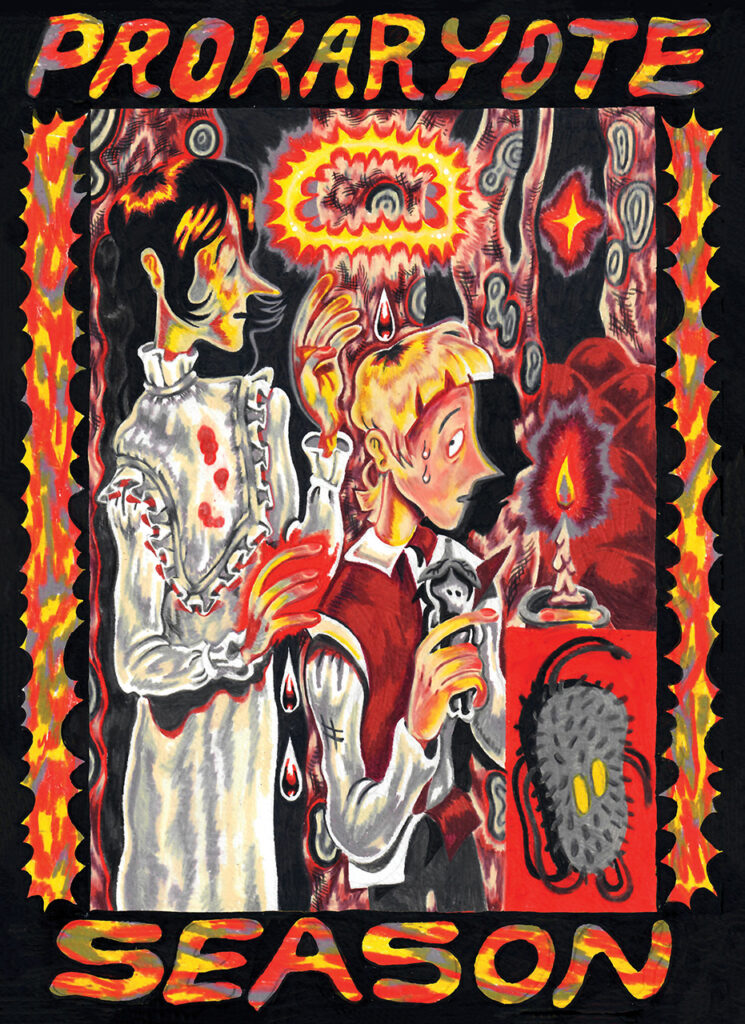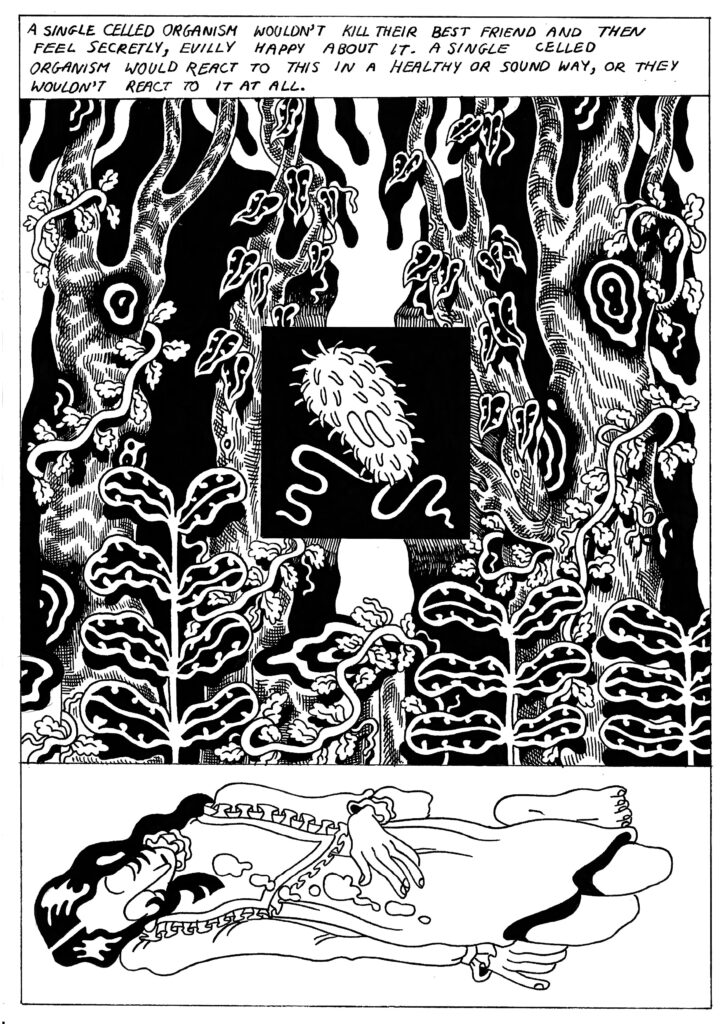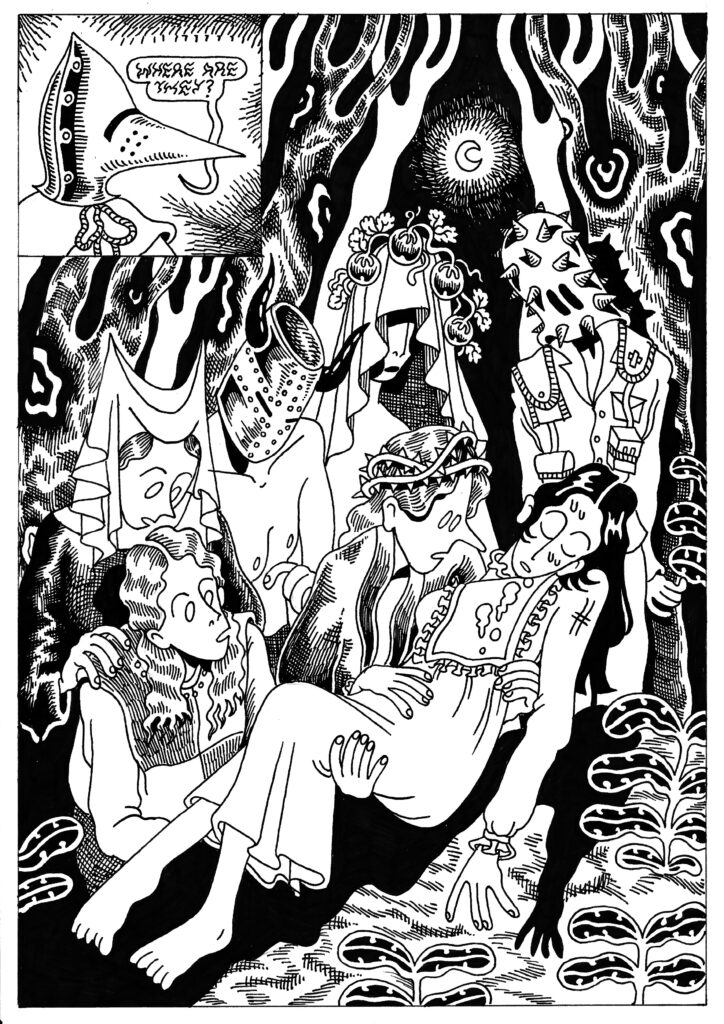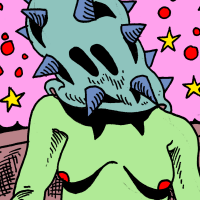Last updated on October 10, 2024
by S.E. Fleenor

Prokaryote Season by Leo Fox is a surreal, melancholy graphic novel about teen pining and queer friendships. Set in the woods where a mysterious illness threatens humanity, this comic explores nihilism, caring too much, and wanting life to be much, much simpler. The queer, trans, and nonbinary characters in this book are…kind of terrible, but achingly relatably so. While they grapple with what it means to love someone and want to fuck them even though you’re just friends, they find they actually might want to live…
Creator Fox takes BoC behind the scenes of creating this one-of-a-kind, trippy graphic novel in this interview. Prokaryote Season is out now from Silver Sprocket where it can be purchased.

The main characters in the book, Sydney, Laurelie, and Trip are all queer, trans, and/or nonbinary. They are also in what I guess I’d call an almost-love triangle. In my own experience, queer and trans friendships can get messy when sexual or romantic attractions don’t match but deep loving connections do. Why did you want to explore a transmasc character pining for their friend and what does the arc of the story tell us about the love of friends?
I wanted to write a story about the addictive quality of pining that I haven’t seen a lot of media, about the way people, especially when we are young, get embroiled in a self-fulfilling loop of yearning for something you think you want, that doesn’t have much basis in reality. I know a lot of queer and/or trans people have very formative intense crushes when they’re young and start to navigate their identities in public, it’s almost an inside joke in queer circles. It can be messy and self-destructive but mostly I think that kind of completely sincere, unabashed, unashamed adoration is really beautiful.
One of my favorite things about this comic is how real the main characters are. They’re teenagers and so their actions are fueled by contradictory motivations, attractions, and impulses, which to be fair, same. I’d love to hear about why you decided to make this book about teens and what you hoped to explore in the process.
Well the simplest answer to this question is that I started making Prokaryote Season when I was 19 and still embroiled in my own complicated melodramatic teen shit. It was the depths of the pandemic and I was feeling nostalgic for the kind of reckless partying and impulsive behavior that seemed impossible to me then, and in a way still is because I’m not a teenager anymore. Prokaryote Season became a kind of goodbye to the way I used to love as a kid: messily, in any and all directions, almost compulsively. I think there’s a kind of teenage drunk hysteria I wanted to channel in the book, where everything is so surreal and heightened and urgent, but also beautiful and magical, which I don’t think would have worked the same had the characters been older. There’s a kind of romanticized frustration and desperation that you only feel when you’re a kid, like you’re pining for someone but you’re also relishing in that feeling. I think that emotional masochism is really characteristic of being a teenager for me.

The metaphor of becoming a single celled organism, or prokaryote, is used throughout the book. I read it as a sort of metaphor for escape from oneself, a kind of coping mechanism that isn’t quite suicidal ideation but isn’t not suicidal ideation. At one point Laurelie says it represents their fear of living. What is it about fantasizing about not existing (or existing in a much simpler state) that makes life bearable and eventually, if we’re as lucky as your characters, makes us want to live?
Yeah I think it’s definitely analogous to suicidal ideation. There’s the feeling that life is suddenly becoming much more complicated than you previously anticipated, and just as you get to grips with the newest layer of complication it gets more complicated again, and you just want to strip it all back to something simpler. There’s a push and pull between the two extremes of nihilism and caring to the point of self-destruction, and I wanted to make something about learning to find the balance.
At one point, Sydney calls themself terrible queer representation. It’s a sweet and sad panel (and I love the sticker Silver Sprocket sent of it!), but it’s also funny because that feeling is probably what most makes Sydney, if not good, accurate representation. The pressure on queer and trans people to be good and wholesome extends to reality, too. Why did you decide to write characters who defy those expectations and what does it mean for irl queer and trans people?
Wanting to fuck your friends as a young queer person can feel like you’re breaking some kind of divine sacred platonic pact and that you’re a degenerate freak for even thinking it. I was 12 years old on tumblr in 2013 and the culture around desire was so weird and stunted, it’s fun to be able to look back and laugh but I think it imbued a lot of young queer people of my generation with a strange guilt and shame that took a while to get rid of. I hope that in the future gay teenagers can admit to themselves that the “complicated” feelings they feel about their very-close best friend might be sexual and that that is ok.
I’ve been thinking a lot lately about how it seems acceptance of neurodivergent people is growing…until the realities of neurodivergence break through and neurodivergent people become difficult instead of quirky. It defies their desire to infantilize and minimize our experiences. (There are some high profile examples of this recently.) In your comic, you explore the less convenient sides of neurodivergence. For example, Sydney, who talks about being autistic, is hounded by the need to overexplain their actions to an unseen jury. Why did you want to explore this aspect of Sydney and why do we need more examples of neurodivergent people being difficult or unruly, even to themselves?
To be honest, I regret not having Sydney display more “difficult” autistic traits. I got diagnosed with autism whilst drawing Prokaryote Season, however I had been pretty certain I was autistic for years before that. I don’t put too much stock in the idea of representation and I don’t find it a useful or inspiring motivator for how I make my work. I just try to speak to my own experience the best I can, which happens to be a trans and autistic one. I think the desire to write a character as an “example” of a neurodivergent person is a non-starter – I’m not an example of an autistic person I just happen to have autism. If you’re invested in writing neurodivergent characters then you should write them with the same level of complexity you would write neurotypical characters, and if you’re not writing neurotypical characters with “difficult” or “unruly” attributes then you probably aren’t writing them very well.

The art has a trippy, at times literally drippy, quality that echoes and amplifies the themes of the story you’re telling. The forest feels alive and the characters all seem unreal and at the same time very real. I’m curious about how your concept, art, and plot came together and how you developed this style.
The concept for Prokaryote Season went through a bunch of different iterations–I knew that I wanted to make a comic about people having emotional turmoil in the woods and I worked through various different versions of that, ideas which went on to inform some of my later comics such as My Body Unspooling, which I think is somewhat thematically similar to Prokaryote Season. I like to draw in a surreal wobbly way. It’s fun.
If readers want to learn more about you and your comic work, where can they find you online?
I’m on instagram @leofox__ I’m currently posting my latest ongoing comic Boy Island there, which features Starman from Prokaryote Season. Check it out if you like my stuff!

Leo Fox is a UK-based cartoonist and painter. He is transmasculine and makes work about it sometimes.
S.E. Fleenor is a writer and editor who wears many hats. They are a freelance developmental editor, editor of Decoded Pride literary magazine, co-founder of QueerSpec.com, and their essays, creative nonfiction, and fiction appear in various publications including The Independent, Buzzfeed Reader, VICE, Electric Literature, Xtra Magazine, them.us, Upworthy, Denver VOICE, and many more. They teach online and in-person writing workshops, and co-host the comics and pop culture podcast Bitches on Comics, which has over 65,000 downloads, putting us in the top 15% of all podcasts. They are a head writer and voice actor for the horror narrative fiction podcast Tales of the Sapphire Bay Hotel, and their short story “Anomalous” was adapted to audio through Decoded Horror Channel’s Graveyard Orbit. They are a member of GALECA: the society of LGBTQ entertainment critics
